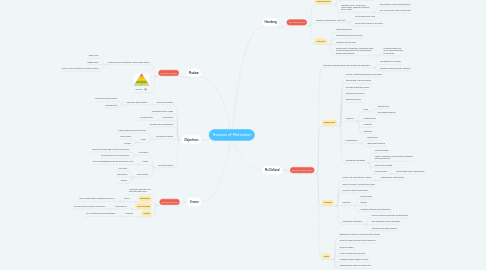
1. Herzberg
1.1. Two-Factor Theory
1.1.1. Hygiene Factors
1.1.1.1. cause dissatisfaction
1.1.1.2. context in which the job is performed
1.1.1.3. company policy, supervision, relationships, working conditions, salary, safety
1.1.1.3.1. their absence cause dissatisfaction
1.1.1.3.2. only focusing on that is not enough
1.1.2. Thematic Apperception Test (TAT)
1.1.2.1. access dominant need
1.1.2.2. write a story based on a picture
1.1.3. Motivators
1.1.3.1. cause satisfaction
1.1.3.2. opportunities to feel succesful
1.1.3.3. related to the job itself
1.1.3.4. achievement, recognition, interesting work, increasing responsibilities, advancement, growth opportunities
1.1.3.4.1. conditions that truly encourage employees to try harder
2. Maslow
2.1. Hierarchy of Needs
2.1.1. Employers are motivated to satisfy their NEEDS
2.1.1.1. basics first
2.1.1.2. highers after
2.1.1.3. once a level is satisfied, no long motivates
2.1.2. Maslow
3. Objectives
3.1. Role of motivation
3.1.1. employee performance
3.1.1.1. provide excellent service
3.1.1.2. achieve goals
3.2. Employees Basic Needs
3.3. Perceptions
3.3.1. Consequences
3.4. Rewards and Punishments
3.5. Motivation Theories
3.5.1. Analyse performance problems
3.5.2. Types
3.5.2.1. Need-based
3.5.2.2. Process
3.6. Job Performance
3.6.1. Motivation
3.6.1.1. desire to achieve a gol / performance level
3.6.1.2. trying hard to accomplish a task
3.6.2. Ability
3.6.2.1. skills and knowledge required to perform a job
3.6.3. Environment
3.6.3.1. resources
3.6.3.2. information
3.6.3.3. support
4. McClelland
4.1. Acquired-Needs Theory
4.1.1. individuals acquired these need in their life experience
4.1.1.1. combination of all three
4.1.1.2. dominant need drive their behavior
4.1.2. Achievement
4.1.2.1. success, meeting deadlines, brilliant ideas
4.1.2.2. strong need to be successful
4.1.2.3. do tasks better than before
4.1.2.4. improve performance
4.1.2.5. challenging goals
4.1.2.6. positions
4.1.2.6.1. sales
4.1.2.6.2. entrepreneurs
4.1.2.6.3. scientists
4.1.2.6.4. engineers
4.1.2.7. organizations
4.1.2.7.1. merit based
4.1.2.7.2. reward performance
4.1.2.8. managerial challenges
4.1.2.8.1. motivate others
4.1.2.8.2. neglect coaching, communicating, meeting with subordinates
4.1.2.8.3. difficult to delegate
4.1.2.8.4. micromanage
4.1.3. Affiliation
4.1.3.1. plans to be with friends or family
4.1.3.1.1. interpersonal relationships
4.1.3.2. want to be liked / accepted by others
4.1.3.3. prefer to interact with others
4.1.3.4. positions
4.1.3.4.1. social worker
4.1.3.4.2. teacher
4.1.3.4.3. frequent interpersonal interactions
4.1.3.5. managerial challenges
4.1.3.5.1. overly concerned how they are perceived
4.1.3.5.2. give employers critical feedback
4.1.3.5.3. discipline poor performances
4.1.4. Power
4.1.4.1. getting work done by influencing other people
4.1.4.2. desire to make an impact on the business
4.1.4.3. influence others
4.1.4.4. control people's environment
4.1.4.5. change the ways things are done
4.1.4.6. negotiate resources for department
4.1.4.7. positions
4.1.4.7.1. managerial
4.1.4.7.2. leadership
5. Vroom
5.1. Expectancy Theory
5.1.1. Individuals evaluate if it's worth putting effort
5.1.2. Expectancy
5.1.2.1. Effort
5.1.2.1.1. Will my effort lead to high performance?
5.1.3. Instrumentality
5.1.3.1. Performance
5.1.3.1.1. Will performance lead to outcomes?
5.1.4. Valence
5.1.4.1. Rewards
5.1.4.1.1. Do I find the outcomes desirable?
